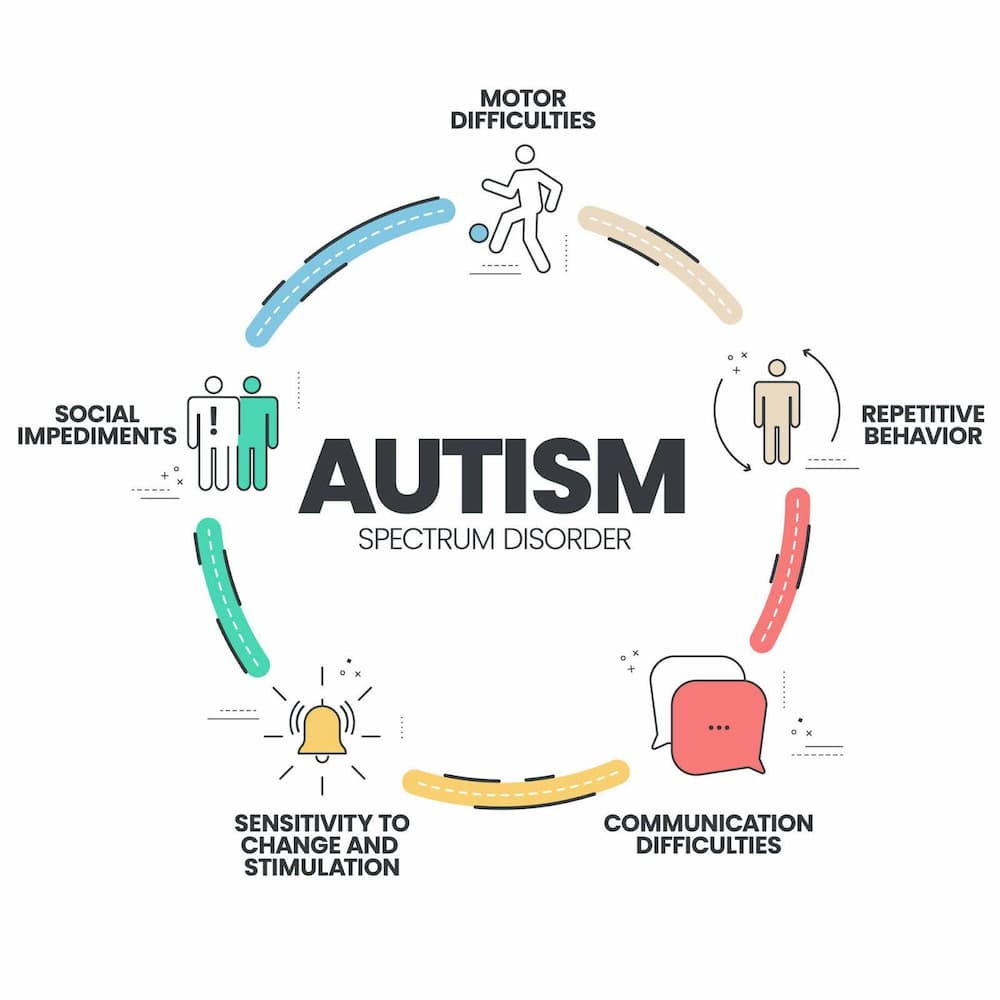The Duty of Education And Learning in Sustaining Pupils with Autism: Ideal Practices
The Duty of Education And Learning in Sustaining Pupils with Autism: Ideal Practices
Blog Article
Understanding Autism: A Comprehensive Guide to Signs and indications
Autism Range Problem (ASD) incorporates a variety of qualities that can substantially influence a person's social communications and daily performance. Recognizing the symptoms and indicators, such as challenges with eye call, social communication difficulties, and sensory sensitivities, is critical for very early intervention. Comprehending these nuances not only help caregivers and educators in supplying appropriate support but additionally promotes a more inclusive environment for individuals with ASD. As we discover the complexities of autism, it comes to be important to consider exactly how these indicators show up in different ways across the range and what effects they hold for reliable intervention strategies.
Summary of Autism Range Condition
Defining Autism Spectrum Problem (ASD) involves identifying it as an intricate neurodevelopmental problem defined by a series of challenges in social interaction, communication, and behavioral patterns. The term "spectrum" reflects the large irregularity in symptoms and their extent, which can vary considerably from one person to another. ASD generally shows up in early youth, although some individuals may not obtain a diagnosis until later on in life.
Elements affecting the advancement of ASD consist of genetic predispositions and ecological variables, although the specific reasons remain under investigation. Diagnosis usually counts on behavior analyses, as there are no definitive clinical examinations for ASD. Early intervention is crucial and can significantly enhance outcomes, concentrating on enhancing communication abilities, social interactions, and adaptive behaviors.
Individuals with ASD might also exhibit special strengths, such as exceptional focus to information or specific areas of proficiency. Understanding the complex nature of ASD is essential for promoting a comprehensive environment that fits neurodiversity. Continued research is important for developing reliable treatments and assistance systems, enabling individuals with ASD to prosper and meet their potential within society.
Usual Signs of Autism
Identifying the typical signs of Autism Range Condition (ASD) is important for very early recognition and treatment. These signs can vary commonly in seriousness and discussion, however specific characteristics are frequently observed in individuals with ASD.
One of the most common signs is a marked trouble in developing and preserving eye contact. Individuals might likewise display restricted passion in social communications and reveal a choice for singular play.
Sensory sensitivities are additionally typical; individuals may overreact or underreact to sensory stimuli, such as audios, lights, or textures. autism. Language growth can be atypical, with some kids showing delayed speech or making use of language in uncommon methods, including echolalia-- duplicating expressions or sentences heard elsewhere
It is necessary to keep in mind that not every person with ASD will present all these indications, and the level of these actions can vary considerably. Early recognition enables for timely assistance and sources, boosting the top quality of life for those on the spectrum.
Social Interaction Difficulties
Social communication difficulties are a hallmark of Autism Range Condition (ASD), affecting a person's capability to engage successfully with others. These difficulties can manifest in different ways, including challenges in initiating and maintaining discussions, recognizing social signs, and reacting appropriately in social interactions.
Individuals with ASD may have problem with nonverbal interaction, such as eye call, faces, and body movement. This can lead to misconceptions, as their communicative intent might not be appropriately analyzed by others. Moreover, they may find it challenging to grasp the nuances of tone and context, which are vital for reliable communication.
In team settings, people with ASD may really feel overwhelmed and might not know just how to sign up with in discussions (autism). They may additionally exhibit irregular conversational patterns, such as monologuing about particular rate of interests without identifying social reciprocity
Moreover, these obstacles can cause social isolation or difficulties in forming relationships, as peers might misunderstand their behavior or communication style. Recognizing these social interaction difficulties is vital for fostering encouraging settings that advertise social skills advancement and enhance the quality of communications for helpful resources people on the autism spectrum.
Sensory Level Of Sensitivities and Reactions
Several individuals with Autism Range Condition (ASD) experience heightened sensory level More hints of sensitivities that can considerably influence their day-to-days live. These level of sensitivities might manifest as over-responsiveness or under-responsiveness to sensory stimulations, including audios, lights, structures, preferences, and smells. An individual with ASD might locate everyday sounds, such as a vacuum cleaner or crowded environments, extremely traumatic, leading to stress and anxiety or disasters. Alternatively, some might display an indifference to discomfort or extreme temperatures, which can posture safety and security issues.
Sensory handling differences in people with ASD can also impact their capability to engage in routine tasks and social interactions. A child who is delicate to touch might withstand physical affection or prevent particular clothing materials. Alternatively, a choice for sure textures or preferences can limit nutritional options and produce difficulties throughout nourishments.
Comprehending these sensory sensitivities is essential for identifying the one-of-a-kind experiences of individuals with ASD. Awareness of their sensory accounts can promote much better interaction and assistance approaches, producing a setting that accommodates their requirements and improves their lifestyle. Inevitably, acknowledging sensory level of sensitivities is a vital part of understanding the broader spectrum of autism.

Supporting People With Autism
Reliable support for individuals with Autism Spectrum Condition (ASD) is crucial for improving their general health and cultivating freedom. Support techniques should be customized to meet the unique needs of each individual, considering their staminas and difficulties.

Social skills training can likewise play a crucial duty. autism. Involving individuals in team activities or role-playing circumstances can enhance their ability to navigate social interactions. Additionally, it is important to enlighten member of the family, caretakers, and peers regarding ASD to promote a inclusive and supportive community
Verdict
By promoting boosted interaction and social skills, people with autism can navigate their settings a lot more effectively. Inevitably, increased understanding and assistance can considerably improve the top quality of life for those affected by ASD.
Autism Spectrum Disorder (ASD) encompasses a vast variety of attributes that can significantly affect an individual's social interactions and day-to-day performance.People with ASD might battle with nonverbal communication, such as eye call, facial expressions, and body language.Numerous people with Autism Spectrum Disorder (ASD) experience increased sensory level of sensitivities that can significantly affect their everyday lives.Sensory handling differences in individuals with ASD can additionally impact their ability to engage in routine tasks and social communications.Recognizing these sensory level of sensitivities is vital for recognizing the special experiences of individuals with ASD.
Report this page